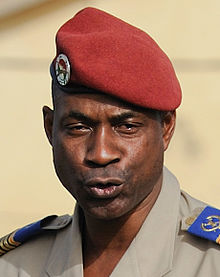Gilbert Diendéré
| Gilbert Diendéré | |
|---|---|
 |
|
| Chairman of the National Council for Democracy of Burkina Faso | |
|
In office 17 September 2015 – 23 September 2015 |
|
| Preceded by | Michel Kafando (Transitional President) |
| Succeeded by | Michel Kafando (Transitional President) |
| Personal details | |
| Born |
c. 1960 (age 56–57) Upper Volta (now Burkina Faso) |
| Political party | Independent |
| Military service | |
| Allegiance |
|
| Rank | General |
| Unit | Regiment of Presidential Security |
Gilbert Diendéré (French pronunciation: [ʒil.bɛʁ djɛn.de.ʁe]; born c. 1960) is a Burkinabé military officer and the Chairman of the National Council for Democracy, the military junta that briefly seized power in Burkina Faso in the September 2015 coup d'état. He was a long-time aide to President Blaise Compaoré, serving as commander of the Regiment of Presidential Security (RSP) during Compaoré's rule. He was appointed as chairman of the junta on 17 September 2015.
Diendéré is suspected of having been directly involved in the October 1987 coup that resulted in the death of Thomas Sankara and installed Blaise Compaoré in power. Diendéré was commander of the national commando training center in Pô at the time of the coup, and all known assailants were identified by the sole survivor of the assault, Alouna Traoré, as having served directly under Diendéré.
During Compaoré's 27 years in power, Diendéré was considered one of his key allies in the military, serving as chief of staff and head of the elite Regiment of Presidential Security, although he was also viewed as a shadowy figure. In late 2014, following the ouster of President Compaoré, Diendéré was dismissed from his military leadership posts by the transitional authorities. Although he no longer headed the RSP, he remained closely linked to it during the events of 2015, in which the RSP found itself at odds with the transitional authorities, which wanted to disband it.
Members of the RSP launched a coup on 16 September 2015, detaining President Michel Kafando and Prime Minister Isaac Zida. On 17 September, Diendéré was appointed as Chairman of the National Council for Democracy, the new military junta. However, the junta failed to consolidate its authority across the country and faced pressure from regional leaders, and eventually from the regular army.
...
Wikipedia
